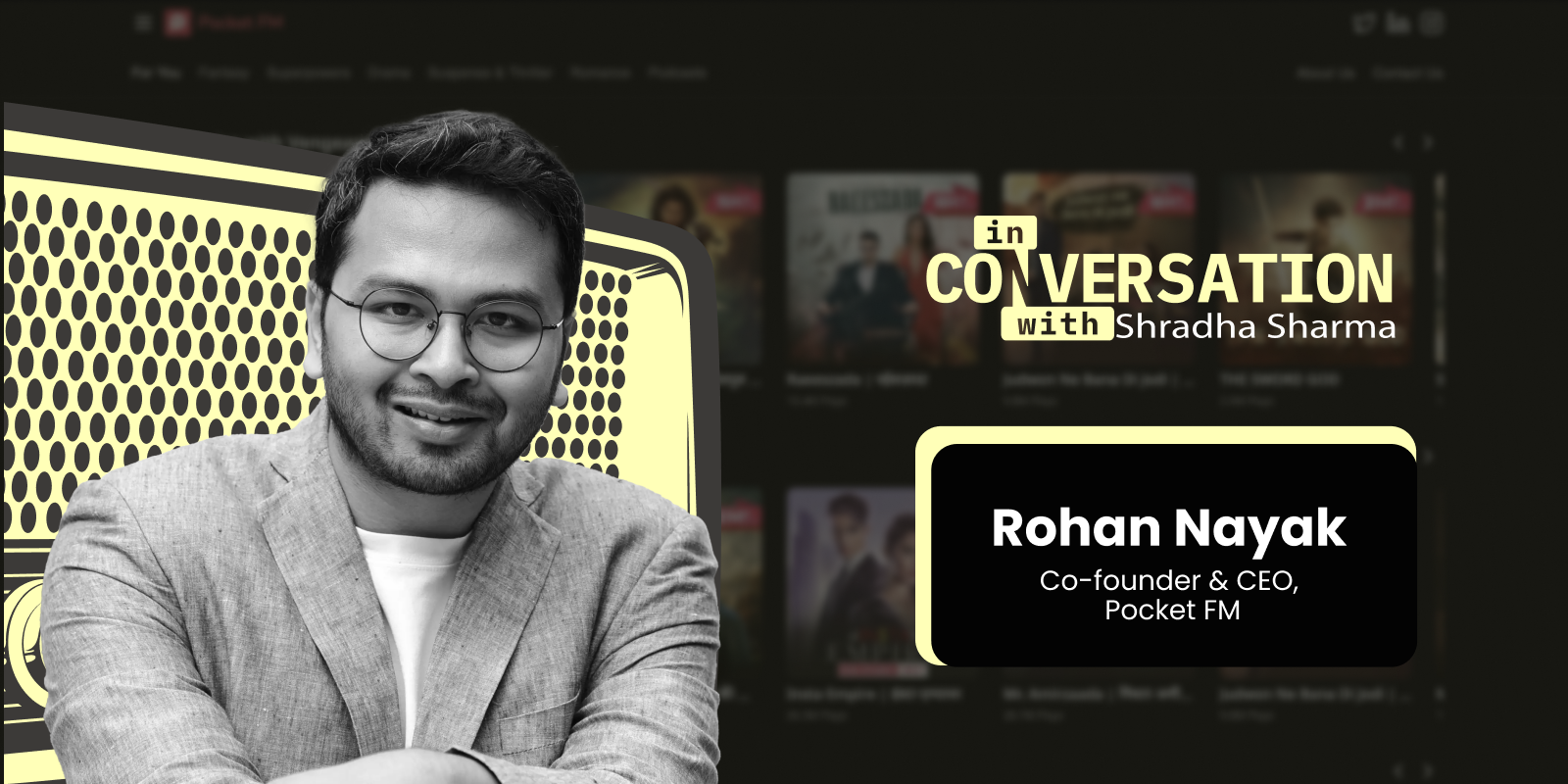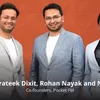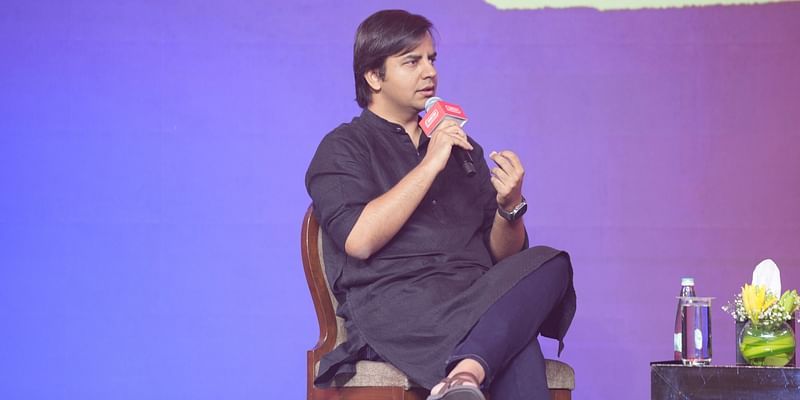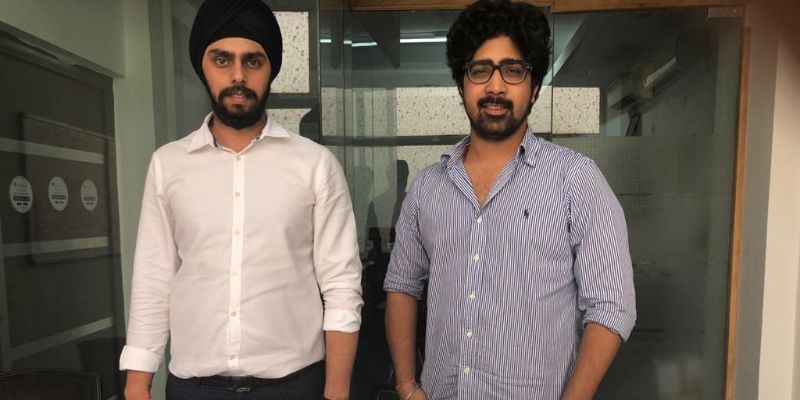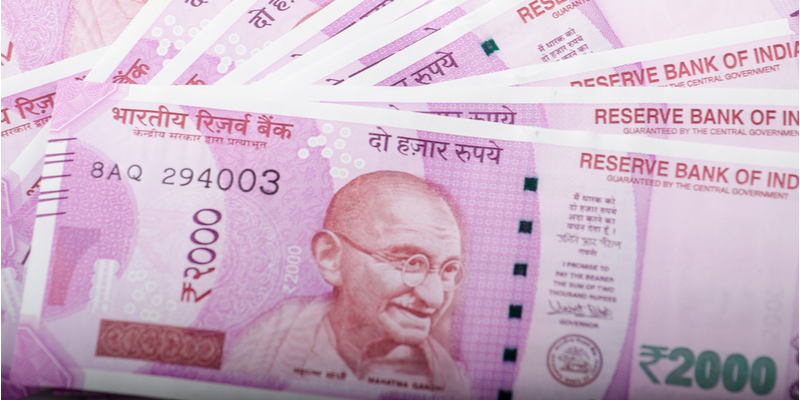2 years; 10 pivots: How Pocket FM escaped death to crack audio
Rohan Nayak, Co-founder and CEO of Pocket FM, on building a successful audio entertainment platform amidst intense scepticism in the market.
Key Takeaways
- Pocket FM recently raised $103 million in Series D funding.
- Pocket FM’s Rohan Nayak believes that audio storytelling will always be relevant and that the key is execution.
- Rohan says that building in India helps create growth playbooks at a fraction of the cost.
- Pocket FM, which is currently present in India and the US, plans to expand to Europe and Latin America this year.
It was the end of 2019. Rohan Nayak was checking the bank balances of . And he realised his startup had a three-month runway left. Things were looking bleak. The dream he had nurtured was slowly flickering out.
He and his co-founders, Prateek Dixit and Nishanth Srinivas, needed capital to stay alive. They met 30 investors of all sizes. No one was interested.
“Who wants to listen to audio content?” they asked.
But they fought against the dying light and landed that big cheque. Lightspeed India and Tencent Holdings wrote them a $5.6 million cheque.
When the money landed in their account, they had the capital to last exactly one week. “We had a near-death moment at Pocket FM even before properly starting up. What helped during this process was having good co-founders and a lot of naïve optimism. I knew we could figure this out,” says Rohan.
Pocket FM's Series A funding proved that audio entertainment is a sustainable business model as long as one pays thorough attention to execution. Since then, there has been no looking back. The audio entertainment platform raised several rounds of funding, the most recent being the $103 million fundraise in a Series D round led by Lightspeed India. In addition, Pocket FM completed its first ESOP buyback worth $8.3 million, with the participation of several current and former employees.
While the platform was set up in 2018, Rohan explains it took two years and 10 pivots to identify the product-market fit. Today, Pocket FM is a category creator of sorts, having reinvigorated the Indian tradition of storytelling through accessible pathways.
So far, the platform has raised ~$196.5 million. It has crossed an annual recurring revenue (ARR) of $150 million, growing 57% on a quarter-on-quarter basis. Pocket FM is present in India and the United States at present. The growth opportunities are aplenty. Deloitte estimates the global audio entertainment industry’s annual revenues to surpass $75 billion in 2024 due to the triple advantage of cost, content, and convenience. As an early mover in this space, Pocket FM stands to gain.

Pocket FM team
Finding a scalable niche
Prior to founding Pocket FM, Rohan was a product lead at a mobile tech startup called Cube26. It was acquired by Paytm in 2018, so Rohan joined the latter’s team. During this time, Rohan had a new business idea, one he stumbled upon during his exhausting three-hour metro ride from Gurugram to the Paytm office in Noida.
“During the long metro rides, I was consuming a lot of audio content. After a point, I found audiobooks boring, and wondered, ‘Why is there no innovation in audio storytelling?” says Rohan.
But this wasn’t a fleeting thought in Rohan’s mind. It was a strong nudge to pursue the vision. That’s when Rohan got together with his IIT Kharagpur batchmate Nishanth and his colleague at Grifers, Prateek, to implement the business idea. And Pocket FM was born.
The early days were rough. Rohan and his co-founders brainstormed business models, including a podcast platform. But they recognised podcasts lacked the pull factor to draw listeners daily. So, the trio was back on the drawing board.
“Audio is meant for long-form consumption. We took the television example and thought, what if we took a television series and reimagined it for audio? So it would be something like daily uploads of an episodic fiction,” explains Rohan.
The fiction idea thrilled three co as their PMF, but they understood it needed to be very engaging to become bingeable.
With that, Pocket FM began its early experiments through episodic fiction and onboarded quality writers.
The platform started with a user engagement rate of five minutes and swiftly moved to 40 minutes a day by the time it raised its Series A. When Pocket FM raised $22.4 million of Series B capital in December 2021, its user engagement rate had zoomed to 120 minutes per day.
The growth figures gave Rohan and his co-founders the confidence to explore new territories. That’s how Pocket FM entered the US market in November 2022.
“Building in India gave us the advantage of creating growth playbooks at a fraction of the cost of what it would take in markets such as the US. Our focus has been on ways to 'productise' growth and create suitable levers. The key is to create products that are replicable across geographies,” Rohan says.
Pocket FM ended 2023 with a $150 million+ ARR, of which more than $100 million comes from the US market. What’s more significant is that the platform grew from 9 to 150 in just two years.
Launching standout audio properties
Audio platforms have two challenges: attraction and retention. Quality audio content helps attract listeners, but what’s critical is to encourage listeners to keep coming back. Pocket FM found this sweet spot in a “freemium” model.
“We have built a freemium model where we give two episodes free every 24 hours. If you want to consume more, you pay per episode. That has dropped the barrier to entry because now you can just pay $2 in the US and Rs 9 in India to watch a few episodes,” explains Rohan.
A combination of great writers and standout audio properties helped Pocket FM scale. To take it a step further, Rohan is keen to build an Intellectual Property (IP) business as a byproduct of Pocket FM. The plan stems from the numbers. For instance, a show called Saving Nora has crossed $18 million in revenues and has a record of 500 million plays. Similarly, Insta Millionaire has $15 million in revenues and 1 billion plays.
“These shows could become big IPs in the future. Our long-term vision is to build an entertainment business starting from audio,” he adds.
The biggest strength of Pocket FM is its strong community of 250,000 writers. Rohan explains that its top writers earn between $25,000 and $50,000 a month.
Full-time writers will help Pocket FM in its organic and inorganic growth journey. Apart from going deeper into the US market, Rohan wants his startup to expand to Europe and Latin America this year. “We want to expand to Germany, Brazil, and the UK. What works is that we have a playbook that can be replicated across geographies,” he says.
Besides horizontal growth through international expansion, the platform is also bullish on vertical growth. In February 2024, Pocket FM launched Pocket Novel, an online reading platform to connect Indian writers and readers. The platform will serve as a gateway for visibility and earning possibilities for writers, besides helping them with distribution across formats and categories. In its beta phase, the platform has built a community of 150,000.
Going forward, Rohan says he is open to inorganic growth opportunities, especially in Generative AI. “We want to build a new-age entertainment platform that uses technology to offer high-quality content,” he adds.
Rohan persisted despite adversities and went against conventional wisdom to build an audio entertainment business. Now, in his quest to transform Pocket FM into “the Netflix of audio”, he continues to challenge all assumptions.






